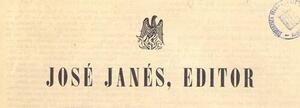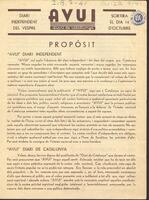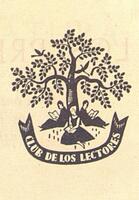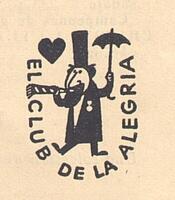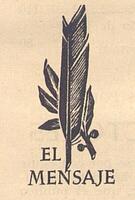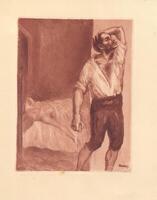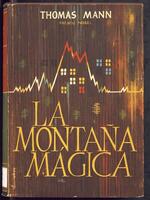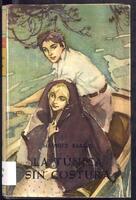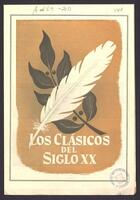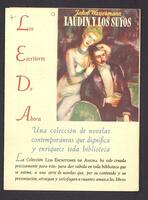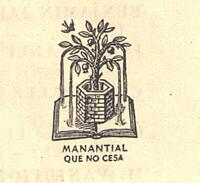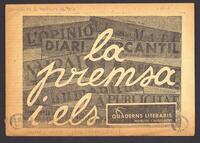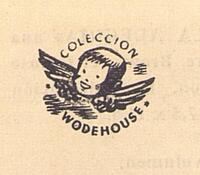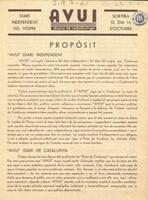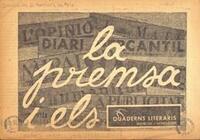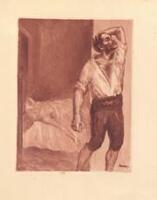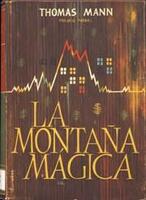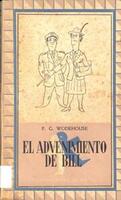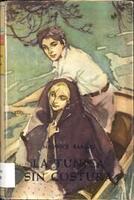Josep Janés, Editor
(Updated 08/10/2024)
Josep Janés, a self-taught publisher and poet, was born in L'Hospitalet de Llobregat in 1913. He founded the magazine Bandera in 1930 and was later the editor-in-chief for El Diari Mercantil between 1932 and 1933 and Avui-Diari de Catalunya in 1933. One year later, he created the popular literary collection Quaderns Literaris, and during the war years he founded La Rosa dels Vents. In 1938, he published the biweekly Avui for the Culture at the Front Services. He was imprisoned in 1939 and was released thanks to the endorsement of the Falangist writers whom he had publicly defended during war time. Two years later he founded the Josep Janés, Editor publishing house.
+ informationSearch collections
Josep Janés collection at the Arxiu Nacional de Catalunya (National Archive of Catalonia)
Catalogue of publishers and booksellers from the Bergnes de las Casas collection (Biblioteca de Catalunya)
Catalogue of publishers of Catalonia from 1940 to 1975 (Biblioteca de Catalunya)
More information and documentation on the works produced
Hurtley, Jacqueline. Josep Janés. El combat per la cultura. Barcelona: Curial, 1986, (Biblioteca de Cultura Catalana; 60)
José Janés: editor de literatura inglesa. Barcelona: PPU, 1992.
Llanas, Manuel. L'Edició a Catalunya. Segle XX (1939-1975). Barcelona: Gremi d’Editors de Catalunya, 2006.
Mengual Català, Josep. A dos tintas. Josep Janés, poeta y editor. Barcelona: Debate, 2013.
Rius i Vila, Joan. El meu Josep Janés i Olivé. L'Hospitalet de Llobregat: l'Ajuntament, 1976.
Samsó Llenas, Joan. La Cultura catalana entre la clandestinitat i la represa pública. Barcelona: Publicacions de l’Abadia de Montserrat, 1995. Vol. 2 (Biblioteca Abat Oliba; 147)
Josep Janés, Editor
Description
Josep Janés, a self-taught publisher and poet, was born in L'Hospitalet de Llobregat in 1913. He founded the magazine Bandera in 1930 and was later the editor-in-chief for El Diari Mercantil between 1932 and 1933 and Avui-Diari de Catalunya in 1933. One year later, he created the popular literary collection Quaderns Literaris, and during the war years he founded La Rosa dels Vents. In 1938, he published the biweekly Avui for the Culture at the Front Services. He was imprisoned in 1939 and was released thanks to the endorsement of the Falangist writers whom he had publicly defended during war time. Two years later he founded the Josep Janés, Editor publishing house.
The newspapers, magazines and literary collections that he created were a prelude to the work he would do as a publisher:
- The Diari Mercantil, published from the 1st of February 1932 until the 8th of August 1933, provided general information on the economy, with news on the stock markets and analyses of the economic situation. It was first edited by Josep A. Vandellós, and with Josep Janés the newspaper took on a literary tone.
- Avui-Diari de Catalunya appeared on the 14th of October 1933. It offered general news and was Catalanist in ideology.
- Quaderns Literaris, a weekly that appeared the 12th of April 1934 which published fiction. Each issue contained a novel. Ruyra, Poe, Stevenson and Espriu are just some of the authors published in this magazine.
- La Biblioteca Rosa dels Vents, April 1936, a literary magazine which primarily published essays. The last issue of this magazine shows the name change from Quaderns Literaris to Edicions de la Rosa dels Vents.
- L'Amic, published from the 1st of January 1938 until December 1938, which was issued by the Culture at the Front Services of the Generalitat, was a magazine that sought to entertain soldiers. It published historical notes, humour and stories. [open access in ARCA]
Title page of the newspaper Avui-Diari de Catalunya, 14th of October 1933.
Advertising brochure for Quaderns Literaris.
In 1941, he founded the company José Janés, Editor, a publishing house that became one of the most powerful in the post-war era. One year earlier he had founded another publishing house, Editorial Emporion, with Félix Ros, and he had revived Quaderns Literaris, but both ventures only lasted a little over a year. Josep Janés, Editor primarily published in Spanish and helped writers who had suffered from retaliation from the Franco regime and were facing economic hardships. It published around 1,600 titles distributed in around 50 collections, which primarily featured English-language fiction and renowned authors like Mann, Proust and Maurois. Janés created the publishing house with the goal of founding a solid, creative project with the intention of becoming a missionary publisher and merchant. Trade, culture, Catholicism and Catalanism were the four cornerstones of his publishing policy, and fiction made up the bulk of its publications.
As a poet, he wrote the compilations Tu (1934), Combat del somni (1937) and Dotze puntes seques (1958), which show a clear influence from Carles Riba.
In 1959, he died in a traffic accident in the town of Els Monjos and the Josep Janés, Editor imprint was acquired by Germán Plaza, who purchased the collection and founded the company named Plaza & Janés.
Josep Janés, Editor
Authors
The most famous names published by this imprint were English-language fiction authors, including G. K. Chesterton, Mary Shelley, Charles Dickens, Jane Austen and Edgar Allan Poe. However, the Josep Janés, Editor catalogue also includes names from the other literary traditions, including Alessandro Manzoni, Marcel Proust and Paul Valéry.
Austen, Jane, 1775-1817
Baring, Maurice, 1874-1945
Bontempelli, Massimo, 1878-1960
Byron, George Gordon Byron, Baron, 1788-1824
Candel, Francisco, 1925-2007
Chesterton, G. K. (Gilbert Keith), 1874-1936
Churchill, Winston, Sir, 1874-1965
Clarasó, Noel, 1899-1985
Dickens, Charles, 1812-1870
Fitzgerald, F. Scott (Francis Scott), 1896-1940
Gide, André, 1869-1951
Goytisolo, Juan, 1931-
Green, Julien, 1900-1998
Homer, s. VIII a.C.- s. VIII a. C.
Juan Arbó, Sebastià, 1902-1984
Keats, John, 1795-1821
Kipling, Rudyard, 1865-1936
Llor, Miquel, 1894-1966
Mann, Thomas, 1875-1955
Manzoni, Alessandro, 1785-1873
Maugham, W. Somerset (William Somerset), 1874-1965
Maurois, André, 1885-1967
Pirandello, Luigi, 1867-1936
Poe, Edgar Allan, 1809-1849
Proust, Marcel, 1871-1922
Scott, Walter, Sir, 1771-1832
Shelley, Mary Wollstonecraft, 1797-1851
Stevenson, Robert Louis, 1850-1894
Tolstoi, Lev, graf, 1828-1910
Twain, Mark, 1835-1910
Valéry, Paul, 1871-1945
Wilde, Oscar, 1854-1900
Wodehouse, P. G. (Pelham Grenville), 1881-1975
Woolf, Virginia, 1882-1941
Wren, Percival Christopher, 1885-1941
Zweig, Stefan, 1881-1942
Josep Janés, Editor
Illustrators and photographers
The illustrators that worked with Josep Janés were students at the Fine Arts School of Barcelona, La Llotja. Joan Palet, Enric Cluselles, Francesc Domingo, Evarist Móra, Will Faber and Joan Commeleran illustrated books issued by Josep Janés, both regular and bibliophile editions. Likewise, Enric Cluselles designed the logos of the Al Monigote de Papel and Hostería del Buen Humor collections.
Engraving by Francesc Domingo in the work by Juan Arbó, Sebastià. Tino Costa. Barcelona: Josep Janés, 1947.
Josep Janés, Editor
Collections
The output of this publishing house was grouped into around 50 collections, prominent among them the ones devoted to the complete works of world-famous authors, Nobel prize winners, contemporary fiction and many others.
Al monigote de papel
Club de los lectores (1955-1959)
Colección horizonte
El club de la alegría
El mensaje (1951-1953)
La hostería del buen humor (1944-1947)
Los clásicos del siglo XX (1950-1954)
Los escritores de ahora (1947-1951)
Los libros de nuestro tiempo (1946-1957)
Maestros de hoy (1957-1958)
Manantial que no cesa (1947-1950)
Premios Goncourt de novela
Premios Nobel de literatura
Premios Pulitzer de novela
Rosa dels Vents (1947)
Wodehouse (1950-1952)
Josep Janés, Editor
Outstanding works
This publishing house primarily issued fiction translated into Spanish, and literature from around the world, especially the United Kingdom. Thomas Mann, P. G. Wodehouse and Maurice Baring are just some of the famous authors published by Janés.
Mann, Thomas. La montaña mágica. Barcelona: José Janés, 1958, dust jacket design by Will Faber.
Wodehouse, P. G. El Advenimiento de Bill. Barcelona: José Janés, 1952 (Al Monigote de Papel; 19), cover illustration probably by Enric Cluselles.
Baring, Maurice. La túnica sin costura. Barcelona: José Janés Edit., [1956] (Club de los lectores ; 41), dust cover design by Enric Cluselles.
